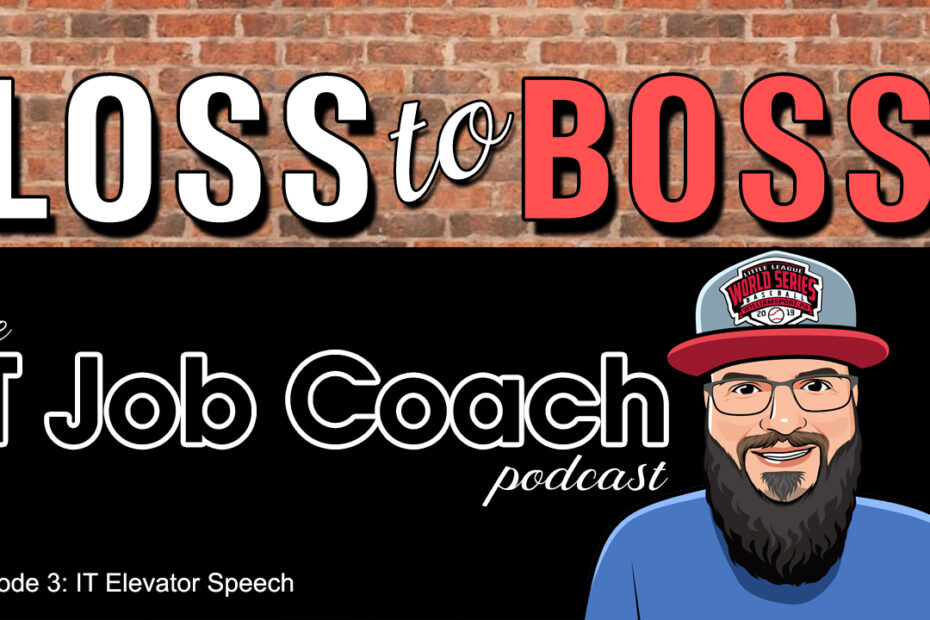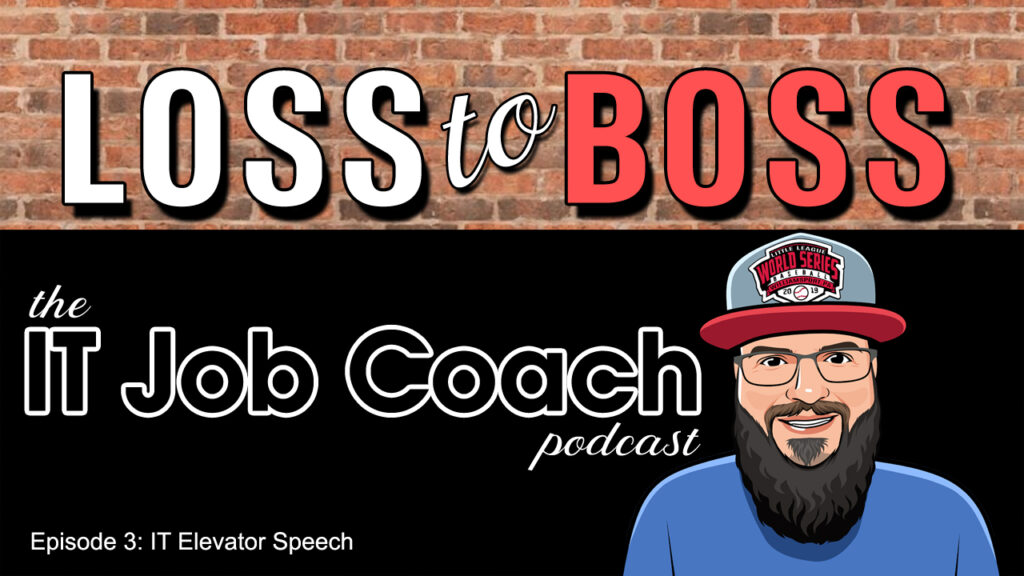You can find this podcast episode on whatever your favor podcast platform is, or you can download the episode here: https://traffic.libsyn.com/a643c65a-d0bb-45e5-9a67-ffcffbe26c7f/Episode_3_-_IT_Elevator_Speech.mp3
Crafting a compelling elevator speech is a valuable skill that can open doors to new opportunities in your professional journey. Whether you’re attending a networking event, participating in a job fair, or facing a crucial interview, a well-prepared elevator speech allows you to make a memorable impression and effectively convey your skills and aspirations in a concise manner. In this article, we will explore five essential tips to help you master the art of elevator speeches.
- Know your audience: Understanding your audience is crucial when delivering an elevator speech. Tailor your message to align with their interests and needs. Research the organization, industry, or individuals you are addressing, and identify the key points that would resonate with them. By customizing your elevator speech to cater to the specific audience, you can create a more impactful connection and demonstrate your relevance.
- Be clear and concise: The essence of an elevator speech lies in its brevity. Aim to deliver your message within 30 to 60 seconds, as the name suggests. Avoid jargon and technical terms that may confuse your listeners. Instead, focus on conveying the most important aspects of your background, skills, and goals. Use simple and easily understandable language to ensure your message is clear, concise, and memorable.
- Highlight your unique value proposition: Capture the attention of your audience by highlighting your unique value proposition. Identify the key strengths, accomplishments, or experiences that set you apart from others. Emphasize the benefits you can bring to an organization or project. Whether it’s your problem-solving abilities, leadership skills, or innovative thinking, make sure to articulate the qualities that make you a valuable asset.
- Practice and refine: As with any form of communication, practice makes perfect. Spend time rehearsing your elevator speech to ensure fluency and confidence when delivering it. Start by writing down your key points and gradually refine them into a coherent narrative. Practice in front of a mirror or with a trusted friend or mentor to receive feedback and fine-tune your delivery. The more you practice, the more natural and polished your elevator speech will become.
- Stay authentic and adaptable: While it’s essential to prepare and practice your elevator speech, it’s equally important to remain authentic and adaptable. Be genuine in your delivery, allowing your passion and enthusiasm to shine through. Avoid sounding scripted or rehearsed. Additionally, be prepared to adapt your elevator speech based on the context or specific interaction. Customize your message while keeping the core elements intact, ensuring it resonates with the individual or organization you are engaging with.
A well-crafted elevator speech can be a powerful tool in your professional arsenal. By implementing the five tips outlined above, you can confidently deliver a concise, impactful, and memorable introduction to yourself and your professional aspirations. Remember to know your audience, be clear and concise, highlight your unique value proposition, practice and refine your delivery, and stay authentic and adaptable. With these skills honed, you’ll be well-equipped to seize opportunities and make lasting connections on your path to success.
Episode Transcript”
Welcome to The Lost to Boss Podcast, your go-to source for it, career advice and guidance. Whether you’re just entering the workforce, seeking to make a career pivot, or you have recently experienced job loss. This podcast is here to support you. Now here is your host, Frank DeMaio.
Hey everyone, and welcome to this episode of Lost to Boss. Today we’re gonna be talking about elevator speeches. What is an elevator speech? How do I do it right? Let’s talk about elevator speeches. An elevator speech really is a brief overview of your background and experience, and it’s important to have an elevator speech ready to go at any time, because you never know when you’re gonna run into somebody who’s gonna ask about you, and it’s always good to have something in your pocket ready to go.
Now an EL term elevator speech comes from the scenario of you’re in an elevator, someone high up in your company gets on the elevator with you, and on the way up the person says to you, oh, nice to meet you. What do you, who are you and what do you do here? And you have basically, you know, 60 seconds or the time they get in the elevator until you reach your floor to give them an overview of who you are and what you do.
So thinking about what an elevator speech is and how it can be used, there’s a couple different scenarios for that. One is you’re in your interview and they say to you, Hey Bill, tell me about yourself. Or, Hey Janna, why don’t you give us a little bit of a overview of who you are, and this is really a softball question, right?
If you’re prepared with your elevator speech, at any time when they ask you that, you’re gonna be ready to go, and a lot of times interviewers will ask that. So it’s really important to have something prepared. Another place you can use that is in a career fair. Right. You’re walking around to different booths.
Folks are there. You’re meeting people. They might ask you, oh, hey, um, who are you? Or How are you? Tell me a little bit about yourself. And this way you have something ready to go. A third place that you can also use this, and because it’s really a summary of who you are and your background. Another great place is in social media.
You know LinkedIn. This could be a great place for your summary section of your LinkedIn profile. Or something along those lines. So it’s really very versatile. It’s important to have it. It’s something you can prepare for and you can practice. So it’s a really great tool. So to design your elevator speech, you should take a few things into account.
One is your skills. What skills are you gonna bring to the table? Two is be positive, right? Your elevator speech. You wanna have positivity, you wanna be radiant in what you’re saying. You also wanna talk a little bit about your goals for the future. Elevator speech ultimately should be very persuasive in what you can bring to them and how valuable you would be to their company.
So you don’t need to run through all your experience in going through your skills with your elevator speech. Choose a few key highlights. From your experience, those that are impactful, right? If it’s a networking event, you’re gonna wanna start off your speech with introducing yourself first with your name.
So nice to meet you. My name is Frank De Mayo, and then talk about your most recent role and what it was. What’s one of your big accomplishments that you’re most proud of? If you’re a recent graduate and you don’t have any work experience, big accomplishments, think about your schoolwork, think about the projects you’re involved in.
Those can be extremely helpful as well. Then take them through your historical experience, right? Some. What are some of the things that you’ve done in the past, especially work-wise, how did that lead you to where you are today? And then finish it off with something for the future thinking. What’s your next step?
You can talk a little bit about that and then why it is you’re interested in a position with that company, if you’re at a job fair or why you’re interested in that position. If you’re in the middle of an interview. So let me give an example of an elevator speech that I might deliver during an interview.
Now, if this was during a networking event or a career fair, I would probably start off by saying, hello, my name is Frank De Mayo, and then I would go into this. But in an interview, they may say, Frank, tell us a little bit about yourself. And I. Would say something along the lines of, I’m an excellent IT leader who’s had many successes in building strong high performing teams.
In fact, recently my team was recognized as having resolved tickets faster than any other team in the organization. I’ve had many different roles in my career. Mostly specific to it T S M or IT service management. And I’m very interested in this position because I believe my experience and my skills are really aligned for success and would ensure that this team could also reach a high level of S L A attainment.
Long-term, I’m really interested in growing with a company, building my skills and experience while helping to make that organization a better place to work. So that kind of hits on all the things, right? I have my experience in there, what I’ve able been able to accomplish. It kind of talks about the roles that I’ve held previously.
It’s a very concise. Quick elevator speech, right? I’m not gonna go on and on. We definitely don’t wanna do that in an interview. You always wanna keep it to the appropriate length. And it also talks about me growing with their company and what I wanna do and how I wanna help them. So it’s not always about me, me, me, right?
I also wanna explain to them what they’re gonna get out of it too. So that’s gonna wrap it up for today. Thank you for listening. If you like this episode, be sure to check out the next one.
If you enjoyed this episode and you’d like to help support the podcast, please subscribe and leave a rating and review. To stay up to date with Lost to Boss and get all the behind the scenes content you can check us out on www.losttoboss.com.

